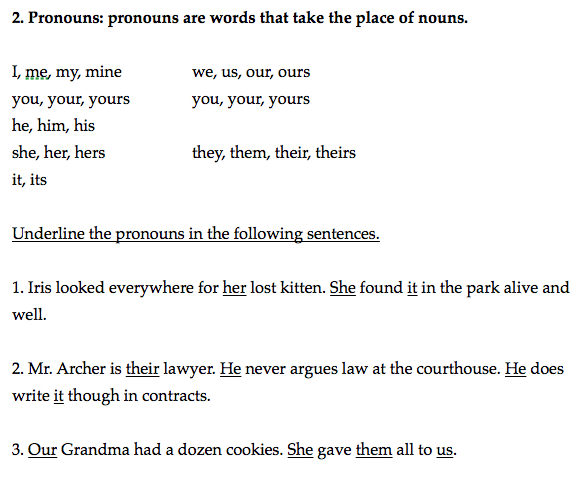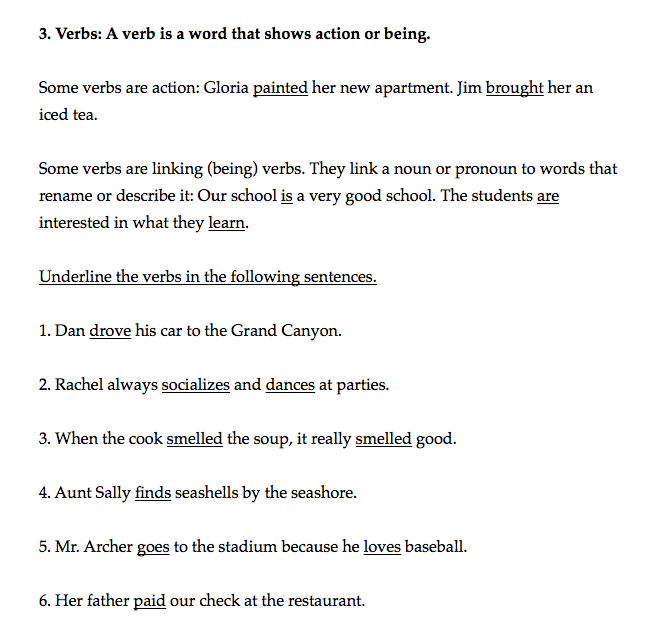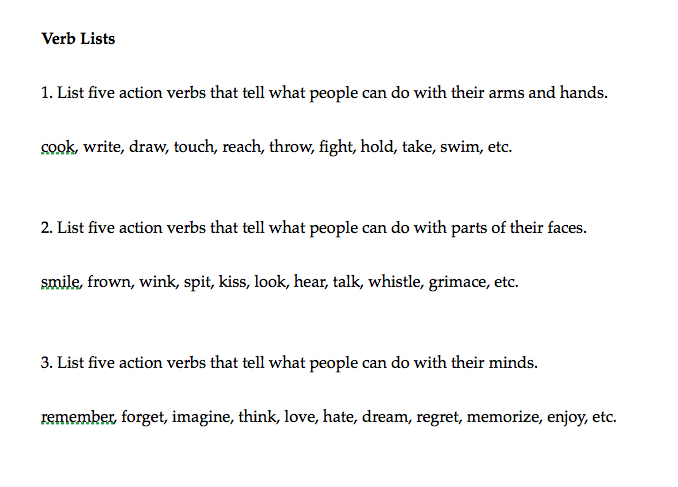…
Objective:
This lesson is for beginner ESL students to understand how English works. Nouns, pronouns, verbs, adjectives, and adverbs are discussed by the teacher with enough information for the learners to recognize them in the sentences. The main objective is to give students the best tools and skills to learn on their own.
Method:
Teacher talk and direction
Students work from handout or lecture, groups of three
Materials:
This lesson, Parts of Speech
Bilingual dictionaries
To the teacher:
This lesson plan works as a lecture, and if the teacher is able to use a computer and a projector, the lesson could be done in class from the Internet. It can be printed as a hand out. Students can work in groups doing the sentence exercises. They may use bi-lingual dictionaries as they work.
The PDF attachment can be downloaded and printed and is free. The PDF has the sentences with and without the answers. And it is new and improved. Enjoy.
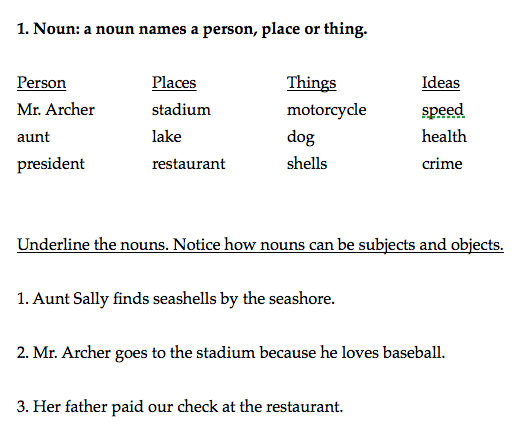
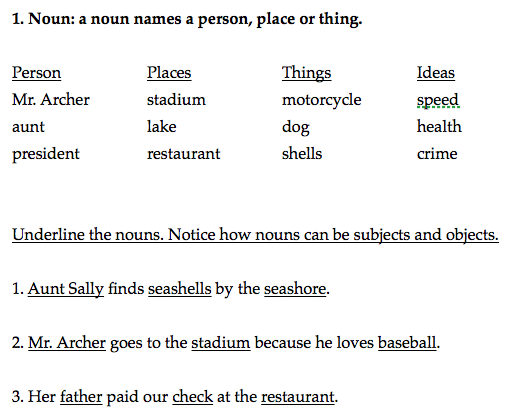
The Lecture with Examples: Parts of Speech: Nouns, Pronouns, Verbs, Adjectives, and Adverbs
…
Nouns:
A noun names a person, place or thing. It can be concrete or abstract. A concrete noun is a word that can be seen, touched, heard, tasted, or smelled. The abstract noun is an idea that can be thought about and discussed.
Person: Mr. Archer, aunt, president
Places: stadium, lake, restaurant
Things: motorcycle, dog, shells
Ideas: speed, health, crime
…
Underline the nouns. Notice how nouns can be subjects and objects.
Circle the nouns.
1. Aunt Rose finds shells by the sea every day of the week.
2. Mr. Archer goes to the stadium because he loves baseball.
3. Her father paid our check at the restaurant and called us a cab too.
4. The senator walked to the microphone and gave a speech for half an hour.
…
…
Pronouns:
Pronouns are words that take the place of nouns. The pronoun comes after the noun it refers to.
I, me, my, mine
you, your, yours
he, him, his
she, her, hers
it, its
we, us, our, ours
you, your, yours
they, them, their, theirs
…
Underline the pronouns in the following sentences.
1. Iris looked everywhere for her lost kitten. She found it in the park alive and well.
2. I gave my sister your favorite book. She didn’t seem to like it though.
3. Our Grandma baked us cookies. She gave them all to us. We love her so much!
4. Mr. Archer is their lawyer. When he argued their case in court, it cost them a lot.
…
Verbs:
A verb is a word that shows action or being.
Some verbs are action: Gloria painted her new apartment. Jim brought her an iced tea.
Some verbs are linking (being) verbs. They link a noun or pronoun to words that rename or describe it: Our school is a very good school. The students are interested in what they learn.
Underline the verbs in the following sentences.
1. Dan drove to the Grand Canyon where he saw an eagle fly and the sun set.
2. Rachel socializes and dances at parties.
3. This party is wonderful. Do you think they like it?
4. When the cook smelled the soup, it really smelled good.
5. Aunt Sally found seashells at the seashore. What did you find?
6. Mr. Archer goes to the stadium because he loves baseball.
7. Are you all right? Would you like to sit down? Should I call you a cab?
8. I thought the movie was pretty good, but my friends think it stinks.
…
Verb Lists
1. List five action verbs that tell what people can do with their arms and hands.
cook,
2. List five action verbs that tell what people can do with parts of their faces.
smile,
3. List five action verbs that tell what people can do with their minds.
remember,
…
…
Adjectives:
Adjectives describe nouns. They tell which one, what kind, how many. They go in front of the nouns they describe: the red coat, the delicious cake, the beautiful picture.
What kind: big, little, young, old, sloppy, neat
Which one: this, that, these, those
How many: many, few, one, two, some, several
Circle the adjectives in the following sentences.
1. The curious diver discovered hidden treasure in the deep ocean.
2. The old dog wagged its brown tail rapidly when its kind master returned.
3. The fortunate shopper bought expensive sneakers cheaply at the final sale.
…
…
Adverbs:
Adverbs describe verbs. They tell how, when and where. They are not fixed in a sentence like an adjective. Adverbs often can move around.
Sometimes English confuses me. English sometimes confuses me. English confuses me sometimes.
Underline the adverbs in the following sentences.
1. He writes here. (Where does he write?)
2. The bride smiled happily. (How did the bride smile?)
3. The letter came early. (When did the letter come?)
4. Quickly the time flew. And they soon knew it too.
5. Thankfully the money will arrive shortly.
6. Finally they decided to go. We finally did too. He also left finally, but not before her.
…
The Lecture with Answers
…
Nouns:
A noun names a person, place or thing. It can be concrete or abstract. A concrete noun is a word that can be seen, touched, heard, tasted, or smelled. The abstract noun is an idea that can be thought about and discussed.
Person: Mr. Archer, aunt, president
Places: stadium, lake, restaurant
Things: motorcycle, dog, shells
Ideas: speed, health, crime
…
Underline the nouns. Notice how nouns can be subjects and objects.
1. Aunt Rose finds shells by the sea every day of the week.
2. Mr. Archer goes to the stadium because he loves baseball.
3. Her father paid our check at the restaurant and called us a cab too.
4. The senator walked to the microphone and gave a speech for half an hour.
…
…
Pronouns:
Pronouns are words that take the place of nouns. The pronoun comes after the noun it refers to.
I, me, my, mine
you, your, yours
he, him, his
she, her, hers
it, its
we, us, our, ours
you, your, yours
they, them, their, theirs
…
Underline the pronouns in the following sentences.
1. Iris looked everywhere for her lost kitten. She found it in the park alive and well.
2. I gave my sister your favorite book. She didn’t seem to like it though.
3. Our Grandma baked us cookies. She gave them all to us. We love her so much!
4. Mr. Archer is their lawyer. When he argued their case in court, it cost them a lot.
…
…
Verbs:
A verb is a word that shows action or being.
Some verbs are action: Gloria painted her new apartment. Jim brought her an iced tea.
Some verbs are linking (being) verbs. They link a noun or pronoun to words that rename or describe it: Our school is a very good school. The students are interested in what they learn.
Underline the verbs in the following sentences.
1. Dan drove to the Grand Canyon where he saw an eagle fly and the sun set.
2. Rachel socializes and dances at parties.
3. This party is wonderful. Do you think they like it?
4. When the cook smelled the soup, it really smelled good.
5. Aunt Sally found seashells at the seashore. What did you find?
6. Mr. Archer goes to the stadium because he loves baseball.
7. Are you all right? Would you like to sit down? Should I call you a cab?
8. I thought the movie was pretty good, but my friends think it stinks.
…
Verb Lists
1. List five action verbs that tell what people can do with their arms and hands.
cook, lift, draw, write, paint, comb, cut, touch, reach, throw, fight, hold, take, swim
2. List five action verbs that tell what people can do with parts of their faces.
smile, frown, bite, spit, look, smell, see, wink, kiss, hear, talk, whistle, grimace
3. List five action verbs that tell what people can do with their minds.
remember, forget, love, hate, plan, organize, count, imagine, think, dream, regret, memorize, enjoy
…
…
Adjectives:
Adjectives describe nouns. They tell which one, what kind, how many. They go in front of the noun they describe: the red coat, the delicious cake, the beautiful picture.
What kind: big, little, young, old, sloppy, neat
Which one: this, that, these, those
How many: many, few, one, two, some, several
Underline the adjectives in the following sentences.
1. The curious diver discovered hidden treasure in the deep ocean.
2. The old dog wagged its brown tail rapidly when its kind master returned.
3. The fortunate shopper bought expensive sneakers cheaply at the final sale.
…
…
Adverbs:
Adverbs describe verbs. They tell how, when and where. They are not fixed in a sentence like an adjective. Adverbs can move around.
Sometimes English confuses me. English sometimes confuses me. English confuses me sometimes.
Underline the adverbs in the following sentences.
1. He writes here. (Where does he write?)
2. The bride smiled happily. (How did the bride smile?)
3. The letter came early. (When did the letter come?)
4. Quickly the time flew. And they soon knew it too.
5. Thankfully the money will arrive shortly.
6. Finally they decided to go. We finally did too. He also left finally, but not before her.
…







